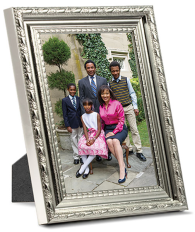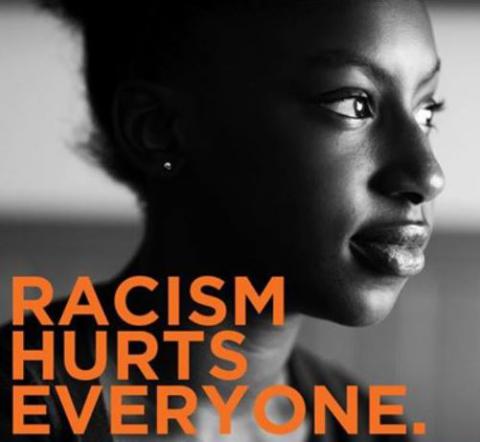I knew the day would come, but I didn't know how it would happen, where I would be, or how I would respond. It is the moment that every black parent fears: the day their child is called a nigger.
My wife and I, both African-Americans, constitute one of those Type A couples with Ivy League undergraduate and graduate degrees, who, for many years, believed that if we worked hard and maintained great jobs, we could insulate our children from the blatant manifestations of bigotry that we experienced as children in the 1960s and '70s. We divided our lives between a house in a liberal New York suburb and an apartment on Park Avenue, sent our three kids to a diverse New York City private school, and outfitted them with the accoutrements of success: preppy clothes, perfect diction, and that air of quiet graciousness. We convinced ourselves that the economic privilege we bestowed on them could buffer these adolescents against what so many black and Latino children face while living in mostly white settings: being profiled by neighbors, followed in stores, and stopped by police simply because their race makes them suspect.
But it happened nevertheless in July, when I was 100 miles away.

The Graham family at home
Family photo: Christine Butler
It was a Tuesday afternoon when my 15-year-old son called from his academic summer program at a leafy New England boarding school and told me that as he was walking across campus, a gray Acura with a broken rear taillight pulled up beside him. He continued along the sidewalk, and two men leaned out of the car and glared at him.
"Are you the only nigger at Mellon Academy*?" one shouted.
Certain that he had not heard them correctly, my son moved closer to the curb, and asked politely, "I'm sorry; I didn't hear you ... "
But he had heard correctly. And this time the man spoke more clearly. "Only ... nigger," he said with added emphasis.
My son froze. He dropped his backpack in alarm and stepped back from the idling car. Within seconds, the men floored the sedan's accelerator, honked the horn loudly, and drove off, their laughter echoing behind them.
By the time he recounted his experience a few minutes later, my son was back in his dorm room, ensconced on the third floor of a four-story, redbrick fortress. He tried to grasp the meaning of the story as he told it: why the men chose to stop him, why they did it in broad daylight, why they were so calm and deliberate.
"Why would they do that - to me?" he whispered breathlessly into the phone. "Dad, they don't know me. And they weren't acting drunk. It's just 3:30 in the afternoon. They could see me, and I could see them!" My son rambled on, describing the car and the men, asking questions that I couldn't completely answer. One very clear and cogent query was why, in Connecticut in 2014, grown men would target a student, who wasn't bothering them, to harass in broad daylight. The men intended to be menacing. "They got so close - like they were trying to ask directions. ... They were definitely trying to scare me," he said, as I interrupted.
"Are you okay? Are you -"
"Yeah," he continued anxiously. "I'm okay. I guess. ... Do you think they saw which dorm I went back to? Maybe I shouldn't have told my roommate. Should I stay in my dorm and not go to the library tonight?"
Despite his reluctance, I insisted that he report the incident to the school. His chief concern was not wanting the white students and administrators to think of him as being special, different, or "racial." That was his word. "If the other kids around here find out that I was called a nigger, and that I complained about it," my son pleaded, "then they will call me `racial,' and will be thinking about race every time they see me. I can't have that." For the next four weeks of the summer program, my son remained leery of cars that slowed in his proximity (he's still leery today). He avoided sidewalks, choosing instead to walk on campus lawns. And he worried continually about being perceived as racially odd or different.
Herein lay the difference between my son's black childhood and my own. Not only was I assaulted by the n-word so much earlier in life - at age 7, while visiting relatives in Memphis - but I also had many other experiences that differentiated my life from the lives of my white childhood friends. There was no way that they would "forget" that I was different. The times, in fact, dictated that they should not forget; our situation would be unavoidably "racial." When we moved into our home in an all-white neighborhood in suburban New York in December 1967, at the height of the black-power movement and the Rev. Martin Luther King Jr.'s civil-rights marches, integration did not - at all - mean assimilation. So my small Afro, the three African dashiki-style shirts that I wore to school every other week, and the Southern-style deep-fried chicken and watermelon slices that my Southern-born mother placed lovingly in my school lunchbox all elicited surprise and questions from the white kids who regarded me suspiciously as they walked to school or sat with me in the cafeteria. After all, in the '60s, it was an "event" - and generally not a trouble-free one - when a black family integrated a white neighborhood. Our welcome was nothing like the comically naïve portrayal carried off by Sidney Poitier and his white fiancée's liberal family members in Guess Who's Coming to Dinner, which had opened the very month that we moved in.
It wasn't about awkward pauses, lingering stares, and subtle attempts of "throwing shade" our way. It was often blatant and sometimes ugly. Brokers openly refused to show houses to my parents in any of the neighborhoods that we requested, and once we found a house in The New York Times Sunday classifieds, the seller demanded a price almost 25 percent higher than listed in the paper. A day after Mom and Dad signed the contract, a small band of neighbors circulated a petition that outlined their desire to preemptively buy the house from the seller to circumvent its sale to us. My parents were so uncertain of this new racial adventure that they held onto our prior house for another four years - renting it on a year-to-year lease - "just in case," as my mother always warned, with trepidation on her tongue.
Referred to as "that black family that moved onto Soundview," we never quite felt in step with our surroundings. A year after moving in, my 9-year-old brother was pulling me down our quiet street in his red-and-white Radio Flyer wagon when we were accosted by a siren-screaming police car; an officer stepped out shouting, "Now, where did you boys steal that wagon?" Pointing breathlessly to our house a few yards away, we tried to explain that it was my brother's new wagon, but the officer ushered us into the back seat. Our anguished mother heard the siren and ran across three lawns to intervene. What I remember most is how it captured the powerlessness and racial isolation that defined our childhood in that neighborhood.
[Lawrence Otis Graham is an African-American attorney, speaker, and New York Times best-selling author.]


Spread the word